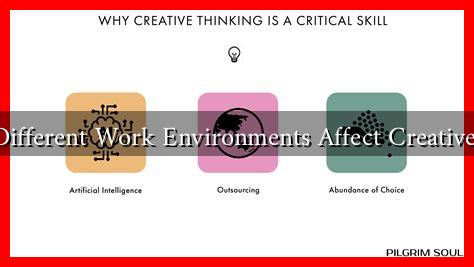-
Table of Contents
How Do Different Work Environments Affect Creative Thinking?
Creative thinking is a vital component of innovation and problem-solving in the workplace. However, the environment in which individuals work can significantly influence their ability to think creatively. This article explores how various work environments—ranging from traditional offices to remote setups—affect creative thinking, supported by research, case studies, and practical examples.
The Impact of Physical Space on Creativity
The physical workspace plays a crucial role in shaping employees’ creative output. Research indicates that the design and layout of an office can either foster or hinder creativity. Here are some key factors to consider:
- Open vs. Closed Spaces: Open office layouts are often praised for promoting collaboration and communication. However, studies have shown that they can also lead to distractions, which may stifle creative thinking. A study by the University of California found that employees in open offices reported a 70% decrease in face-to-face interactions, which can negatively impact brainstorming sessions.
- Natural Light: Access to natural light has been linked to improved mood and productivity. A study published in the Journal of Environmental Psychology found that employees with access to natural light reported higher levels of creativity and overall job satisfaction.
- Personalization: Allowing employees to personalize their workspace can enhance their sense of ownership and comfort, leading to increased creative output. A survey by Steelcase found that 88% of employees feel more productive when they can personalize their workspace.
The Role of Company Culture
Company culture significantly influences how employees approach creative thinking. A culture that encourages risk-taking and values diverse perspectives can lead to more innovative ideas. Key elements of a creative culture include:
- Encouragement of Experimentation: Companies like Google and 3M have famously adopted policies that allow employees to spend a portion of their time on personal projects. This freedom fosters innovation and leads to groundbreaking products like Gmail and Post-it Notes.
- Diversity and Inclusion: A diverse workforce brings a variety of perspectives and experiences, which can enhance creative problem-solving. Research from McKinsey shows that companies with diverse teams are 35% more likely to outperform their competitors in terms of profitability.
- Open Communication: A culture that promotes open dialogue encourages employees to share ideas without fear of criticism. This can lead to a more collaborative environment where creativity thrives.
Remote Work and Creative Thinking
The rise of remote work has transformed traditional notions of the workplace. While some argue that remote work can hinder creativity due to isolation, others believe it can enhance it by providing flexibility. Consider the following:
- Flexibility and Autonomy: Remote work allows employees to create their own schedules and work environments, which can lead to increased creativity. A study by Buffer found that 20% of remote workers cited flexibility as a key benefit, allowing them to work during their most productive hours.
- Reduced Distractions: For some, working from home can minimize distractions found in traditional office settings, leading to deeper focus and enhanced creative thinking.
- Virtual Collaboration Tools: Tools like Slack, Zoom, and Miro facilitate collaboration among remote teams, enabling brainstorming sessions and idea sharing that can spark creativity.
Case Studies: Companies That Foster Creativity
Several companies have successfully created environments that enhance creative thinking:
- Pixar: The animation studio is known for its open office layout, which encourages spontaneous interactions among employees. This design has led to a culture of collaboration and innovation, resulting in critically acclaimed films.
- Airbnb: The company’s headquarters features a variety of workspaces, including quiet areas for focused work and collaborative spaces for brainstorming. This flexibility has contributed to Airbnb’s reputation for creativity in the travel industry.
Conclusion
In conclusion, the work environment plays a pivotal role in shaping creative thinking. Factors such as physical space, company culture, and the shift to remote work all contribute to how individuals generate and develop ideas. By understanding these dynamics, organizations can create environments that foster creativity, leading to innovation and success. As the workplace continues to evolve, prioritizing creative thinking will be essential for companies aiming to thrive in a competitive landscape.
For further reading on the impact of work environments on creativity, you can explore resources from Forbes and Harvard Business Review.

